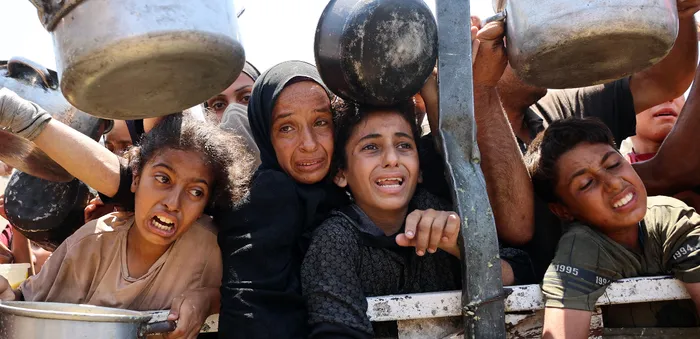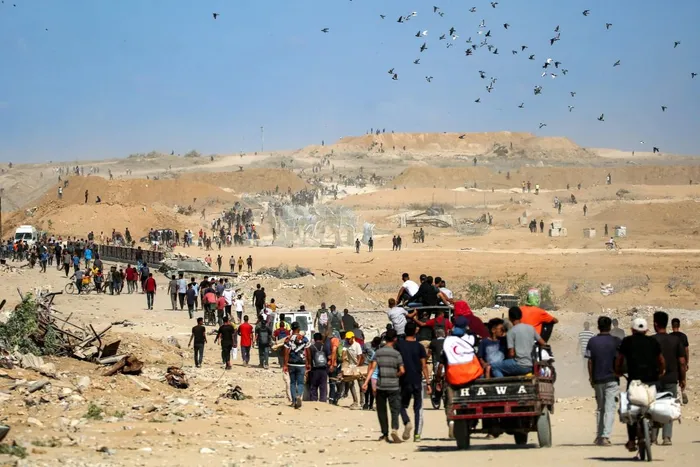Only justice will give Gaza ceasefire meaning

Palestinians receive lentil soup at a food distribution point in Gaza City. The World Health Organization warned that malnutrition was reaching "alarming levels" in Gaza.
Image: Omar Al-Qattaa / AFP
THERE is now, at last, a ceasefire in Gaza. The bombs have stopped falling, the skies no longer scream with drones, and the death toll, for the moment, has paused its upward march.
But to speak of peace, or even of “progress,” in the shadow of so much devastation, is to mock the very notion of justice. What has been achieved is not peace; it is merely silence, a silence purchased with tens of thousands of Palestinian lives, and one that conceals the deeper crime that the world refuses to confront: the complete and deliberate evasion of justice.
Justice was never part of the ceasefire negotiations. It was never raised in the corridors of power or the emergency sessions of the UN Security Council. The world’s diplomats spoke of “humanitarian pauses,” “confidence-building measures,” and “mutual restraint,” as though this were a symmetrical conflict between equals.

Gaza's civil defence agency said on October 10 that Israeli forces have begun pulling back from parts of the territory, particularly in Gaza City and Khan Yunis.
Image: Eyad Baba/ AFP
Yet there is nothing equal about a people trapped in an open-air prison and an occupying power armed with one of the world’s most sophisticated militaries. Justice was not side lined, it was erased.
The international community’s response has been a study in moral cowardice. Western governments, quick to sermonise about human rights elsewhere, have twisted themselves into rhetorical knots to avoid even uttering the word “occupation.”
They speak of “tragic civilian losses” as though they were acts of God, not the deliberate outcomes of military policy. They call for “reconstruction” while still funding the regime that ensured Gaza’s destruction. The ceasefire, then, is not the beginning of justice, it is the burial of it.
For Palestinians, justice has always been deferred, diluted, or denied outright. Each war ends with promises of inquiry, accountability, and aid; each ceasefire becomes a prelude to the next round of annihilation. Gaza will be rebuilt, again. Children will return to the ruins of their schools, again. And the world will congratulate itself on “restoring calm,” while ignoring that calm under occupation is simply another form of violence.
What international law demands, accountability for war crimes, an end to collective punishment, the restoration of rights and dignity, is precisely what the international order refuses to deliver.
The global silence around justice is not neutral, it is complicit. The refusal to pursue accountability for the siege, the bombings, and the mass displacement of civilians is a political choice.
It is the choice to privilege “stability” over humanity, and “diplomacy” over moral clarity. Even the most grotesque acts, hospitals shelled, refugee camps flattened, journalists killed, are absorbed into the grey language of “complexity” and “security dilemmas.” In this moral fog, perpetrators become partners, victims become statistics, and justice becomes an inconvenience.
And yet, without justice, the ceasefire will hold no meaning. Gaza is not merely a humanitarian crisis; it is a political and moral catastrophe. To rebuild homes without rebuilding rights is to construct prisons with better plumbing.
To feed the hungry without freeing the besieged is to perpetuate the very order that starves them. What Gaza needs is not charity, it needs accountability. What Palestinians deserve is not pity, it is justice.
The obscenest phrase in our political lexicon today is “post-war Gaza.” As if this were an ordinary conflict that could simply be “resolved” and rebuilt. But Gaza’s tragedy is not post-war, it is perpetual war. It is occupation, blockade, and apartheid masquerading as self-defence. Until these structures of domination are dismantled, any ceasefire is only an intermission between atrocities.
The diplomats will return to their capitals, the headlines will move on, and the world will congratulate itself for “ending the war.” But for Palestinians, the war never ends—it only changes shape.
The ceasefire may silence the bombs, but it cannot silence the demand that echoes through the rubble and refugee camps: justice. And until that demand is met, there will be no peace, no reconciliation, and no moral redemption for a world that has once again mistaken quiet for justice, and impunity for peace. In Gaza, the ceasefire is not the end of the war. It is the continuation of injustice by other means.
Brown is an MPhil candidate at UCT.